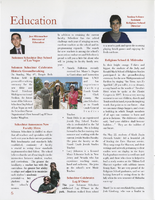Search the Special Collections and Archives Portal
Search Results

Transcript of interview with Marguerite Goldstein by Carol A. Semendoff, February 25, 1979
Date
Archival Collection
Description
On February 25 1979, collector, Carol A. Semendoff interviewed cashier, Marguerite Goldstein, (born on May 1925 in Oberlin, Kansas) in the library at the University of Nevada, Las Vegas. This interview covers early Las Vegas, from 1950 to 1979. Also included during this interview is discussion on local dignitaries, the growth of Las Vegas, gambling as the major industry in Las Vegas, Strip hotels, and housing developments.
Text

Transcript of interview with Chris Bianchi by David G. Schwartz, April 14, 2015
Date
Archival Collection
Description
Text

Transcript of interview with Horace Emery by Barry Sarles, March 2, 1980
Date
Description
On March 2, 1980, Barry Sarles interviewed river boatman and dam worker, Horace Emery (born 1911 in California) at his older brother’s farm in Nelson, Nevada. This interview covers the local area around Nelson and the early events that helped shape the area. Also present during the interview, Barry Sarles’s girlfriend, Diane Dobaj and Horace’s older brother, Merl Emery. Mr. Sarles also discusses his work as a river boatman on the Colorado River, working on the Hoover and Davis Dams, and employment as a factory worker in Clark County.
Text

Transcript of interview with Mae Farei by Martha Jane Cunningham, February 24, 1980
Date
Archival Collection
Description
On February 24, 1980, Martha Cunningham interviewed her aunt, Mae Farei (born 1909 in Illinois), about her experiences living in Nevada. Farei first talks about the development of the Downtown and Strip areas. She then discusses work at the Twin Lakes Lodge and Stardust as a housekeeper, and she later mentions some of the recreational activities available to those in Nevada. She also mentions the importance of Nellis Air Force Base and expresses her appreciation for living in Southern Nevada.
Text

Transcript of interview with Edna Jackson-Ferguson, April 15, 1975
Date
Archival Collection
Description
On April 15, 1975, Edna Jackson-Ferguson (born 1897 in Overbrook, Kansas) provided a narrative-style oral history about her and her husband Jack’s experiences during the building of the Hoover Dam. Jackson-Ferguson provides many details about the way of life living in the camp with workers of the dam, the tasks required of those workers in building the dam, and some of the actual processes of pouring the concrete for the structure. She also talks about food, transportation, weather, and entertainment during the time. To conclude the interview, Jackson-Ferguson mentions some of the other job positions her husband held and their pride in being a part of the Hoover Dam’s construction.
Text

Irving Junior Foreman interview, March 16, 1978: transcript
Date
Archival Collection
Description
From the Ralph Roske Oral History Project on Early Las Vegas collection OH-00600. On March 16, 1978, collector John Russell Foreman interviewed Irving Junior Foreman (born June 25th, 1930 in Beaver, Utah) in North Las Vegas, Nevada. In this interview, Foreman speaks about his career in the construction industry in Las Vegas, Nevada. He also discusses the changes in the construction industry from the 1950s to the 1970s, including the machinery used.
Text

Transcript of interview with Sharon Gutzman by Lisa Mades, March 13, 1981
Date
Archival Collection
Description
On March 13, 1981, Lisa Mades interviewed Sharon Gutzman (born in Winnipeg, Canada in 1935). Gutzman talks much about early Las Vegas, Nevada, including early businesses, the first casinos, and the first airport. She also discusses educations, shopping, recreation, entertainment, and gambling.
Text

Ellen Lempe interview, March 23, 1977: transcript
Date
Archival Collection
Description
On March 23, 1977, Paul Pearson interviewed Ellen Lempe (b. 1928 in Detroit, Michigan). Lempe details her life in Sturgis, Michigan—her marriage, her kids and an automobile accident that resulted in gangrene and amputation—before moving to Las Vegas, Nevada. She recounts working as a telephone operator, gambling after work and a big win playing keno. Moreover, she describes her disinterest for politics, her husband’s love for sports and his work as a car salesman. The two end by discussing inflation and the changing attitude and landscape of the city.
Text

James Matson interview, February 23, 1980: transcript
Date
Archival Collection
Description
On February 23, 1980, Ken Rose interviewed James Matson (b. July 14, 1923 in Pensacola, Florida) about his life in Las Vegas, Nevada. Throughout the interview, Matson discusses his childhood, life in Florida before moving to Las Vegas, his family and what brought him to Las Vegas. Matson also delves into his economic struggles and those of the community, his attempt to purchase a home and the changes he would like to see in society. Moreover, Matson talks about his hobbies, his work in construction and interracial friendships. The interview ends with Matson discussing the city of Las Vegas, the weather and the changing buildings.
Text

